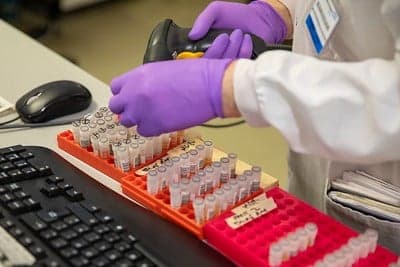Infection rates in Norway 'too low' to justify broad testing

Norway's health agency has abandoned plans to test broadly for coronavirus after judging that the spread of infection in the country is now so low that doing so would be pointless.
Instead, tests will be reserved for those who have symptoms of coronavirus, those who work in healthcare or elderly care homes, and those in risk groups.
If 12,000 random people were tested in Norway today, the Norwegian Institute of Public Health estimated in a press release issued on Monday, 15 would test positive, of which only one would have a real coronavirus infection.
"In such a situation, health professionals should not rely on a positive result until they have taken a new test to confirm it," Joakim Øverbø, a doctor at the institute, said in a statement.
The institute made an exception for elderly care homes, where it has decided staff and patients can be tested whether they exhibit symptoms or not. This is because residents often display fewer typical symptoms, are less able to communicate how they feel, and are at a much higher risk from the virus.
"In such situations, health care professionals should test everyone associated with the unit at a care home where the infection has been detected. If the test answer is negative and you still suspect covid-19, you should take a new test," he says.
In its press release, the agency also explained that test results can remain positive for weeks after a person ceases to be contagious, as the standard PCR test did not distinguish between viral debris and an infectious virus.
In its new test criteria, issued on Monday, the institute set out a list of those who should be tested, in order of priority.
Priorities for coronavirus testing in Norway
1) Patient in need of hospitalisation.
2) Patient or resident at an elderly care home or other health institution.
3) Those employed in the health service in patient-related work.
4) Those in a risk group and their relatives
5) A person in quarantine due to close contact with a confirmed coronavirus case or after traveling.
6) Employee, child or pupil in reopened daycare or school.
7) Others with suspected coronavirus
Those without symptoms should be tested in the following cases:
-
After an outbreak of infection in an elderly care homes, all employees and residents of the affected units should be tested
-
When diagnosing infection in health institutions, it may be appropriate to test asymptomatic close contacts.
-
When new residents move into nursing homes, testing may be appropriate.
-
Prior to certain hospital stays or procedures (although this is up to each hospital).
-
In some cases, foreign universities or employers might require testing. This can be done in a private basis.
-
Research: In some research studies, all participants will be tested regardless of symptoms.
Comments
See Also
Instead, tests will be reserved for those who have symptoms of coronavirus, those who work in healthcare or elderly care homes, and those in risk groups.
If 12,000 random people were tested in Norway today, the Norwegian Institute of Public Health estimated in a press release issued on Monday, 15 would test positive, of which only one would have a real coronavirus infection.
"In such a situation, health professionals should not rely on a positive result until they have taken a new test to confirm it," Joakim Øverbø, a doctor at the institute, said in a statement.
The institute made an exception for elderly care homes, where it has decided staff and patients can be tested whether they exhibit symptoms or not. This is because residents often display fewer typical symptoms, are less able to communicate how they feel, and are at a much higher risk from the virus.
"In such situations, health care professionals should test everyone associated with the unit at a care home where the infection has been detected. If the test answer is negative and you still suspect covid-19, you should take a new test," he says.
In its press release, the agency also explained that test results can remain positive for weeks after a person ceases to be contagious, as the standard PCR test did not distinguish between viral debris and an infectious virus.
In its new test criteria, issued on Monday, the institute set out a list of those who should be tested, in order of priority.
Priorities for coronavirus testing in Norway
1) Patient in need of hospitalisation.
2) Patient or resident at an elderly care home or other health institution.
3) Those employed in the health service in patient-related work.
4) Those in a risk group and their relatives
5) A person in quarantine due to close contact with a confirmed coronavirus case or after traveling.
6) Employee, child or pupil in reopened daycare or school.
7) Others with suspected coronavirus
Those without symptoms should be tested in the following cases:
- After an outbreak of infection in an elderly care homes, all employees and residents of the affected units should be tested
- When diagnosing infection in health institutions, it may be appropriate to test asymptomatic close contacts.
- When new residents move into nursing homes, testing may be appropriate.
- Prior to certain hospital stays or procedures (although this is up to each hospital).
- In some cases, foreign universities or employers might require testing. This can be done in a private basis.
- Research: In some research studies, all participants will be tested regardless of symptoms.
Join the conversation in our comments section below. Share your own views and experience and if you have a question or suggestion for our journalists then email us at [email protected].
Please keep comments civil, constructive and on topic – and make sure to read our terms of use before getting involved.
Please log in here to leave a comment.